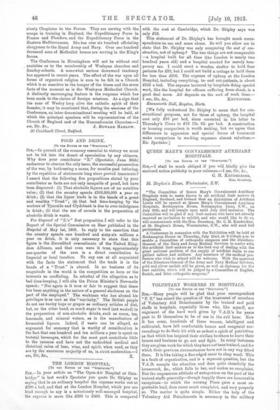VOLUNTARY WORKERS IN HOSPITALS.
[To THE EDITOR ON THE " BIPECTATOR."1 Sin,—Many people will be glad that your correspondent "F. S." has raised the question of the treatment of members of Voluntary Aid Detachments by the trained and paid staffs in hospitals, especially those who, like myself, are cognisant of the hard work given by V.A.D.'s for years past to fit themselves to be of use in the evil hour. Now it has come, hundreds of these women, intelligent and cultivated, have left comfortable homes and congenial sur- roundings to do their bit with as ardent a spirit of patriotism as that which has inspired their civilian brothers to leave their homes and business to go out and fight. In many instances they are given work for which they have not been trained, and for which their previous circumstances have not in any way fitted them. It is like taking a fine-edged razor to chop wood. This is a fault of organization, and is a separate question, but the V.A.D. accepts the situation and does quite cheerfully the housework, &c., which falls to her, and makes no complaint. But the ungenerous attitude of antagonism on the part of the trained staffs generally—though happily there are honourable exceptions—to which the nursing Press gave a most re- grettable lead, does cause much complaint, and very properly so. The matter is quite simple. Either the help of the Voluntary Aid Detachments is necessary in the military hospitals or it is not. If it is, the paid staff should recognize that this help is given, not in rivalry, but often at the sacrifice of health, in order that shortage of ward-maids and probationers and of the money to pay them shall not affect the efficiency of the whole. That V.A.D.'s should be met with ungenerous and discourteous treatment by their fully trained sisters is a blot on a noble profession and should be removed. The qualities required in a good nurse, apart from her training, are inherent in most women, though the superficial and the frivolous are to be found in all ranks. And at this moment of crisis all women who are giving their lives to the great task of alleviating suffering should rise above feminine pettiness and work together in a spirit of helpfulness and in a unity inspired by one ideal—that of [We are bound to say that the attitude of the professional nurse to the V.A.D. probationer is too often that of an eighteenth-century Dean to a Minor Canon, or, shall we say? of an upper to a lower boy. The former regards the latter as hardly a human being. Able professional women, such as are the bulk of the sisters and nurses, should realize that this attitude is doing real harm, and putting impediments in the way of essential work.—ED. Spectator.]



































 Previous page
Previous page